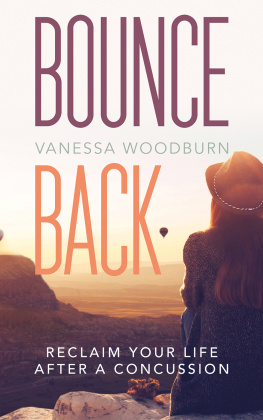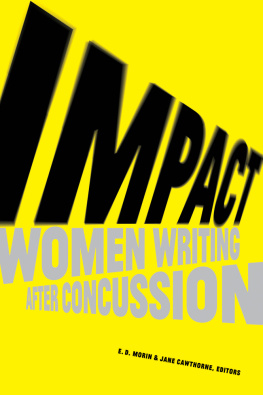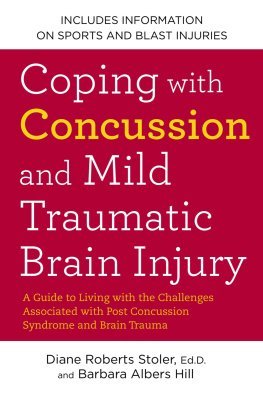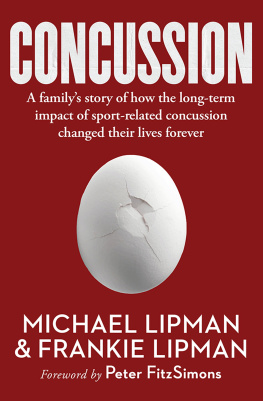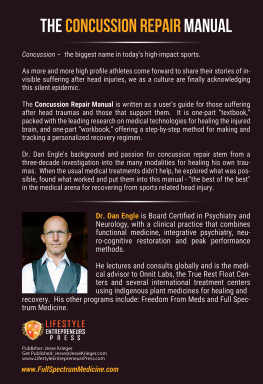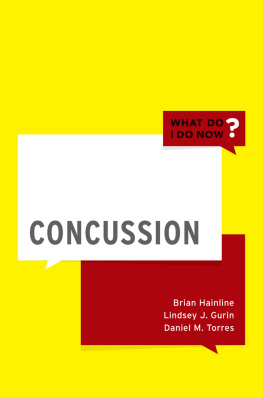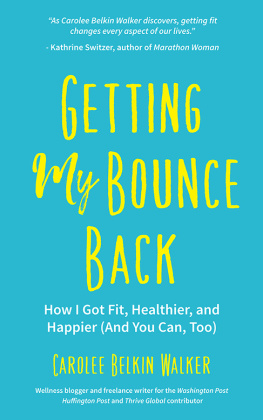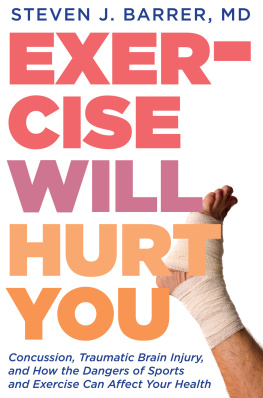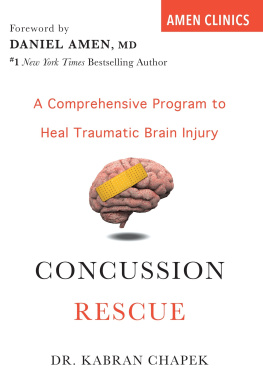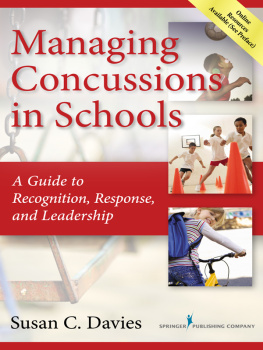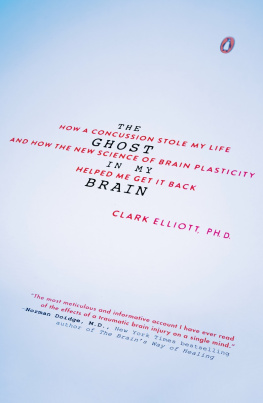All rights reserved. No part of this publication may be reproduced, distributed, or transmitted in any form or by any means, including photocopying, recording, digital scanning, or other electronic or mechanical methods, without the prior written permission of the publisher, except in the case of brief quotations embodied in critical reviews and certain other noncommercial uses permitted by copyright law.
If you are interested in publishing through Lifestyle Entrepreneurs Press, write to:
Publications or foreign rights acquisition of our catalog books.
Learn More: www.LifestyleEntrepreneursPress.com
On Eagles Wings I dedicate this book to my parents, Terry and Peggy. You are both free now. On eagles wings. I promise to find my wings and fly, knowing you are both there to raise me up.
Will This Ever Get Better?
Y ou are holding this book because you or someone you love has experienced a concussion. Life feels like a rollercoaster right now, full of ups and downs and just as dizzying. Concussions can be compared to a software injury in the brain. Your hardware is intact, and on the outside, it appears as though everything is normal. You look fine, people say. But on the inside, it feels as though everything has changed. Nothing is normal. It is the last thing you think about when you fall asleep and the first thing you think about when you wake up. You dont feel like yourself anymore.
People say you should be grateful that your incident wasnt more serious. You are grateful because you know this could have been worse. But it doesnt change the fact that your brain, this amazing, complex, miraculous system between your ears, has been impacted by a force that caused a firestorm in its cells. You have suffered a traumatic brain injury. Among so many other symptoms, you wonder, How will I get through today? Will this headache last forever? Will I always be this tired and irritable? Will I remember everything I need to remember today? Will I be able to hold on and work out all the details in my head about this project? How is this affecting my family? Who am I now? Will this ever get better?
Maybe the healing and recovery are happening along the timeline that your doctor gave you when you received your diagnosis. But perhaps your symptoms are lingering and you are still struggling long after you expected to feel like yourself again. You have days you begin to feel confident and capable again, but then you get slammed with random reminders that everything is not okay. Maybe its in the form of a vice grip sensation in your head from morning until night, or a day when you feel dizzy and close to tears as you walk through the grocery store. It may be the way you startle so easily now, the buzzing and piercing heat that randomly storms through your brain, or the to-do list on your phone that sets off a flood of indecision.
Your family is experiencing this concussion as well. They cant feel your physical pain, but they sense your frustration and sadness. You feel guilty about how your injury affects them, the things you cannot do right now, the time and resources that your healing is taking, and the way you have changed as you try to cope with and manage your responsibilities at home and work. They have no idea how hard Im working to make this look easy, I sobbed to one of my healthcare providers about three months after my concussion. I didnt want my family to see me struggling. I wanted so badly to be okay and for them not to worry about me. I wanted my children to have their mother back.
The pretending is exhausting and lonely. You feel isolated as you go through this experience because it seems so hard to explain your challenges to people about how things are different for you now. Neurologically healthy people try to relate by saying things like, Oh, I forget things all the time. Dont worry about that! But those comments actually minimize the experience that you are living through and make you feel lonelier and more isolated. No one else knows the extent of what has changed, what now requires so much energy while making it look easy like you do.
Six months after my concussion I decided to attend a conference for health coaches in New York City. I had traveled solo dozens of times in my life, but this time I was terrified. I remember lying in bed the night before, crying, What if I forget where to go? What if I get confused? What if I panic? What if I just dont know what to do? My husband consoled and encouraged me, but it was impossible to explain to him the fear that felt so real behind these tears. I simply could not trust my brain to know, do, navigate, decide, and solve the things that had always felt easy and effortless. Im certain that every single person I encountered in the airport and at that conference, saw a capable woman, but they had no idea of the effort and energy it required on my part to make that look easy.
The what-ifs after a concussion can keep you up at night. What if I had done that differently? What if I had seen a different doctor afterwards, or rested more, or rested less? What if I am doing too much, or not enough? What if this never gets better?
You believe that if nothing changes and you always feel stuck here, that the cost may be higher than you can bear. It affects every part of your life: relationships, career, happiness, sense of peace and safety, and sense of self. Who am I now ? This is a quest to return to yourself, get back on your feet, feel healthy and whole, and recover a feeling of normalcy again for you and your family.
On my quest for healing, I began to learn that it was possible to change many of the thoughts and stories that were driving my fears about staying stuck. I began to learn about concussions and what I could do to take care of my body, my brain, and my emotional health after my trauma. I gradually learned that it was possible to rewire my brain to choose thoughts and feelings that honored the possibility and potential of my healing, rather than choosing stories based in fear. I began to see how much I was loved and supported. I learned to ask for help and even more importantly, how to receive it.
You have this book because you or someone you love has had a concussion. You also have this book because you believe in possibility and potential. So do I. I am honored to guide you through these steps to bounce back and reclaim your life.
The Italian Break My Story
I n 2016, my husband Oliver and I decided to do something grand to celebrate our twentieth wedding anniversary. So, we decided to join some friends of ours on a five-day bike tour through the gorgeous Italian region of Piedmont. I had done some road cycling and short distance triathlons early in my twenties, but around that time, my cycling experience involved riding around the parks and paths in our neighborhood with my kids. No problem, I thought! I updated my gear with new cycling shoes and padded shorts and found a fantastic spin class at my local gym to condition myself.
The trip was booked for September 2016. Our children were ten, twelve, and fourteen at the time, so leaving them to go on vacation at the beginning of the school year was a difficult choice for me. Our son Noah would also be celebrating his thirteenth birthday while we were away. Olivers sister and her husband agreed to move into our house for the week with their two young girls to hold down the fort so that we could enjoy this time away.

